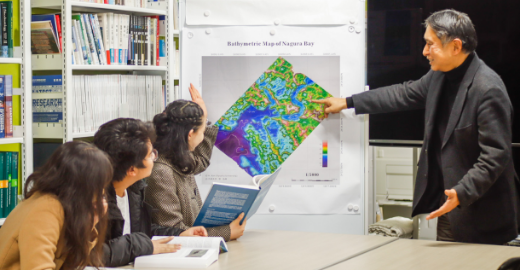Areas: The New Forums for Learning

Humans & Life
Students will learn about the emergence and evolution of life, human thought, cognition, and decision mechanisms through the prism of biology, cognitive science, and neuroscience.
People & Society
Students will learn about language mechanisms in communication, prehistoric societies, multicultural coexistence, welfare in society, and religious views through the prism of sociology, cultural anthropology, and communication studies.
States and Regions
Students will learn about national and regional history, distinctive economic and social phenomena, and political and economic relationships through the prism of political science, economics, and history.
Earth and Environment
Students will learn about the earth’s resources, disasters caused by changes in the global environment, and the impact of life on the environment through the prism of earth and planetary sciences, social/safety system science, and biology.
Crossing Study Areas
Students will study interdisciplinary subjects that serve as a foundation for the four areas for learning and developing reflectiveness. For example, studying such subjects as Design Thinking, Data Science, Global Ethics and Global History will provide the knowledge and abilities that students need to tackle challenges and solve problems.
CURRICULUM
To promote the willingness to learn how to address each issue, students will be given the opportunity to design their own curriculum and gain experience through active learning. The academic program consists of KIKAN Education courses - common, university-wide courses that focus on the fundamentals of learning - and specialized courses that build on these foundations. We also aim for students to acquire practical language skills through intensive language education.
Our CurriculumThrough the four-year curriculum, students will learn interdisciplinary expertise for organically and optimally linking the various discipline-based methodologies for resolving problems through collaborations with others, and will cultivate interdisciplinary problem-solving skills.
FUTURE
PROSPECTS
All graduates’ impressive skill-sets are highly sought after by employers and you will have a very wide choice of careers. This is important because it means you can confidently choose the course you really love, not the one which you think will give you the best career prospects.
More about future prospects





